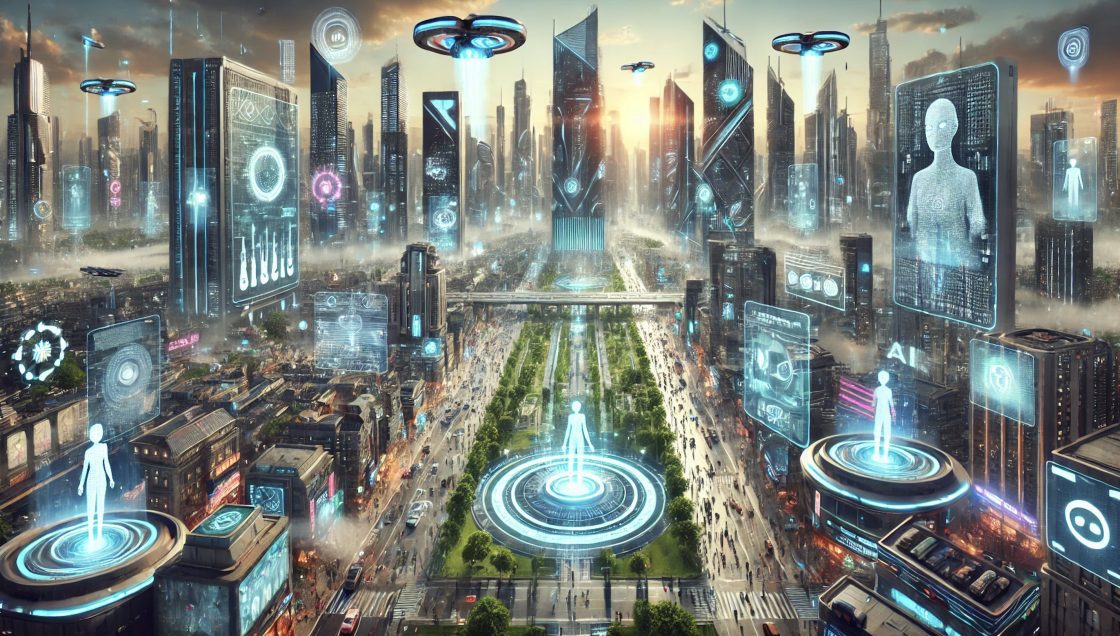In the next few decades, the world will witness a transformation that will revolutionize how we live and work, as AI models become increasingly advanced and integrated into daily life. These models, evolving into fully autonomous personal assistants, are set to handle complex tasks, support individual creativity, and elevate societal productivity to unprecedented levels. What was once the realm of science fiction is now rapidly becoming reality, as AI shapes a new era—one that many are calling the Intelligence Age.
But how did we get here, and what does this leap mean for us?
A Brief History of Progress
Throughout human history, technology has driven transformative changes. From the Stone Age to the Agricultural Age, and then to the Industrial Age, each leap forward has been marked by tools that enhanced human productivity and capability. Today, we stand on the brink of yet another revolutionary phase—one powered by artificial intelligence and deep learning algorithms. According to Sam Altman, co-founder of OpenAI, the development of these algorithms, and their increasing power through scalable resources, has enabled us to achieve things that would have been unimaginable even a few generations ago.
At its core, AI development rests on deep learning—a method by which machines can learn and recognize patterns in data. This technology, coupled with the increasing availability of computational resources, has enabled AI systems to solve complex problems and model solutions with precision. The result? Autonomous AI personal assistants that can help individuals tackle tasks across various domains—from healthcare to education to creative pursuits.
What Will AI Personal Assistants Do?
Imagine a world where every individual has access to a highly capable AI assistant. These assistants won’t just perform simple tasks like scheduling appointments or answering emails; they will evolve into multi-expert systems, capable of managing a wide range of complex responsibilities.
Consider the impact on education. AI tutors could provide personalized instruction tailored to each student’s learning style, pace, and preferred language, ensuring that no one is left behind. In healthcare, AI assistants could streamline medical care, managing appointments, diagnostics, and even suggesting personalized treatments based on real-time health data. In creative industries, AI could work alongside artists, designers, and developers to create new forms of media, software, and more.
A New Kind of Prosperity
As AI integrates more deeply into our lives, we can expect an unprecedented increase in productivity and prosperity. The tools provided by these AI systems will allow humans to tackle problems that once seemed insurmountable, from climate change to space exploration. According to Altman, the level of prosperity AI brings could exceed anything the world has ever seen.
This new prosperity, however, isn’t solely about financial gain. While wealth may increase, the real promise of AI lies in how it can improve quality of life. From reducing healthcare disparities to providing personalized education, AI personal assistants could serve as equalizers, helping to distribute the benefits of progress more widely. Importantly, the role of these AIs in amplifying human creativity will foster an environment where individuals can focus on meaningful pursuits, leading to deeper personal fulfillment.
Society’s New “Scaffolding”
We are not more capable than our ancestors due to genetic evolution, but because we build upon the knowledge and infrastructure they left behind. Society itself is a form of collective intelligence—a scaffolding upon which human capability expands. AI models, as our future autonomous assistants, will contribute significantly to this scaffolding, enabling us to solve problems beyond our current understanding.
This evolution of society’s collective intelligence will be seen in every sector. In science, AI will help researchers make faster breakthroughs, discovering the next generation of technologies. In the corporate world, AI will take over repetitive tasks, freeing up human workers to focus on innovation. Even in fields we don’t yet foresee, AI will act as a catalyst for future inventions and societal progress.
The Challenges of the Intelligence Age
While the promise of AI is exhilarating, it also comes with complex challenges. For one, the development of AI must be inclusive. Altman stresses the need to make AI and computational resources available to everyone. Otherwise, we risk AI becoming a tool used exclusively by the wealthy or even sparking geopolitical conflict over access to these resources. To prevent such scenarios, societies will need to invest in the infrastructure required to support widespread AI adoption—think massive energy investments, advanced computer chips, and the development of secure systems.
In addition, as AI automates many jobs, there will be shifts in the labor market. However, contrary to some fears, AI may not eliminate jobs as quickly as some predict. Instead, it will change the nature of work. History shows us that many jobs we consider indispensable today did not exist a few centuries ago. Lamplighters, for example, were once crucial in cities, but no one looks back wishing they still existed. Similarly, many current jobs may disappear, but new roles—unimaginable to us now—will emerge, driven by AI and the need for human oversight and creativity.
Balancing Innovation and Ethical Considerations
To fully realize the potential of AI personal assistants, we must balance innovation with ethical considerations. Autonomous AI systems will wield tremendous influence over how we interact with the world, how decisions are made, and how resources are allocated. Thus, governments, companies, and communities need to work together to establish frameworks that ensure AI development is responsible, transparent, and inclusive.
The Intelligence Age promises not just vast wealth, but the capacity to solve humanity’s greatest challenges. From curing diseases to reducing carbon footprints to creating entirely new forms of human expression, AI will be an unparalleled partner in shaping the future. However, to unlock this potential, we must address the ethical, social, and economic challenges that accompany such a profound shift.
Looking Ahead
We are standing at the edge of a monumental transformation. AI will soon be our most trusted personal assistants, empowering us to live better, more fulfilled lives. As these models evolve, they will become essential tools in building a more prosperous, intelligent society—one that benefits not just the few but all of humanity.
By embracing AI as a partner in progress, and by ensuring it is developed ethically and inclusively, we can step boldly into the future, where what once seemed like magic will become everyday reality. The Intelligence Age is upon us, and with it, the promise of a brighter, more capable world for generations to come.
Resource Links
samaltman.com
subreddit discussion
financial times
benzinga
south china morning post
yahoo finance
business insider
venture beat


